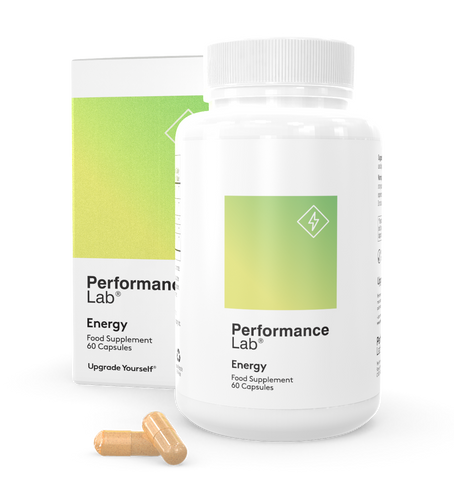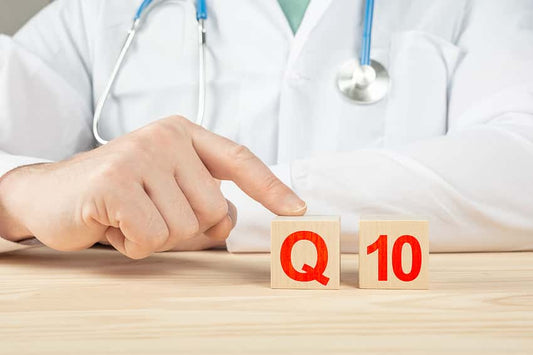For anyone looking for weight loss, you’re not alone—it’s one of the most common health goals and somehow one of the hardest to achieve.
Most experts agree that diet and exercise profoundly impact weight and fat loss, but they’re not the only two pieces of the puzzle. If you’re looking for long-term suitable weight loss, you must consider things like sleep, stress, and even nutrient depletions.
Although coenzyme Q10 (CoQ10) is best known for its role in heart health, few people know that CoQ10 also plays a vital role in metabolic function and fat burning. So, while you may be cutting calories and popping back weight loss supplements, could CoQ10 be the best-kept weight-loss secret?
This article dives into the details of CoQ10 and how it may support weight loss efforts. We’ll cover what it is, why you need it, and if it can help you shed a few pounds.
What is CoQ10?
Coenzyme Q10, commonly referred to as just CoQ10, is a vitamin-like fat-soluble quinone that’s naturally present in tissues of the body, with exceptionally high concentrations found in the most metabolically active tissues, such as the heart, brain, liver, kidneys, speed, pancreas, and adrenal glands 1.
While you may think that being widespread in so many tissues, there would be high concentrations of CoQ10; it’s the opposite. The body stores relatively small amounts of CoQ10, roughly 500 to 1,500mg, which means that if you’re not eating a diet rich in CoQ10, levels will decline, especially with age.
But the reason we need CoQ10 for optimal function is because of one specific organelle: mitochondria. They’re the cellular powerhouses responsible for the majority of energy production—and CoQ10 plays a critical role in oxidative phosphorylation in mitochondria; this process converts energy from food into ATP (energy) that’s used to drive all cellular functions.
Ubiquinone (CoQ10) is one of two mobile carriers that move electrons between enzyme complexes during the energy production cycle in mitochondria 2.
While we’re not going to get into the process of oxidative phosphorylation, it’s essential to know that without adequate levels of CoQ10, there are no electron carriers to support the movement of electrons down the chain to produce ATP.
Without this step, the respiratory chain becomes dysfunctional, and energy production suffers, thereby reducing the efficiency of cells and interfering with energy levels 2.
The bulk of energy is produced in mitochondria through oxidative phosphorylation. Because almost all cellular processes rely on ATP, CoQ10 becomes an essential piece of the puzzle to maintaining the health and function of all organs and tissues 2.
Energy metabolism dysfunction can lead to several chronic diseases and has been suggested as a treatment for various cardiac, neurologic, oncologic, and immunologic disorders 3.
CoQ10 is essential for cellular performance, and low levels can spell trouble. But besides ATP production, what’s it involved in?
What Does Coq10 Do?
1. Supports Energy Production
Whether you’re looking for more energy to get through your workouts or to reduce the amount of coffee needed to get you through your day, CoQ10 is gold for that.
It’s one of the most critical components of the cellular machinery required to generate ATP, the fundamental energy substrate used to power all cellular activities 4.
A CoQ10 deficiency has been linked to respiratory chain dysfunction due to insufficient production of the energetic compounds required to support cell function, ultimately leading to poor cellular efficiency and low energy.
2. Boosts Antioxidant Defenses
On top of being involved in energy production, the other critical role of CoQ10 in its reduced form, ubiquinol, is as a powerful lipophilic antioxidant in cell membranes 5—and it’s the only lipid antioxidant that can be produced in the body.
Alpha-tocopherol (vitamin E) is considered one of the most powerful lipid-soluble antioxidants available in humans, but research finds that ubiquinol-10 is equally as effective 6.
It may also spare alpha-tocopherol when both antioxidants are present in the same liposomal membranes, thereby maintaining sufficient levels of other critical antioxidants.
But what may come as a surprise is that despite how powerful vitamin E is, cell membrane concentrations of CoQ10 can be as much as 30x greater than vitamin E 7! CoQ10 plays a role in regenerating tocopherol, and insufficient levels can lead to delayed and inefficient regeneration 4.
Studies also find that when oxidative stress levels are high from lack of dietary selenium or alpha-tocopherol, membrane concentrations of CoQ10 are increased exponentially to compensate for low antioxidant status.
3. Improves Heart Health
If there’s one thing CoQ10 is known for, it’s heart health—it exhibits antioxidant, bioenergetic, anti-inflammatory, membrane stabilizer, and antiatherogenic functions that can be protective against a variety of chronic diseases and cardiometabolic disorders like hypertension, ischemic heart disease, myocardial infarction, cardiomyopathies, heart failure, dyslipidemia, obesity, and more 8.
But because oxidative stress seems to be a component of many of these diseases, CoQ10’s potent antioxidant properties can mitigate oxidative stress and reduce CVD risk 9.
Beyond that, it’s also essential for supporting the energetic needs of the heart. As we said before, CoQ10 is concentrated in metabolically active tissues like the heart, which require a substantial amount of energy to initiate contractions.
Some experts suggest that myocardial failure may be due to mitochondrial malfunction and insufficient energy production, possibly due to low CoQ10 10. On top of that, the anti-inflammatory effects may help mitigate cardiovascular damage caused by pro-inflammatory molecules.
Research has confirmed that CoQ10 has benefits for reducing inflammation by regulating nitric oxide levels (a signaling molecule and vasodilator) and modulating levels of cytokines 8.
CoQ10 and Weight Loss
But if there’s one little-known benefit of CoQ10, weight loss and fat loss is it.
You may remember that your body produces energy from a molecule called ATP in mitochondria, which are responsible for taking nutrients like glucose and fatty acids and converting them into energy via the Krebs cycle.
When energy intake is insufficient, your body relies on breaking down stored body fat for energy; triglycerides are broken down into fatty acids and acetyl CoA molecules and enter the Krebs cycle.
And with the help of electron-binder CoQ10, these electrons can be transported through the chain to support ATP production.
But that’s not it. CoQ10 also stimulates an enzyme called AMPK, which regulates energy balance in cells and prevents fat accumulation that can lead to chronic diseases like diabetes and obesity 11.
Although its effect in humans isn’t clear, animal studies show that CoQ10 can improve fat metabolism and prevent obesity by improving mitochondrial function and insulin sensitivity 12.
Impaired insulin sensitivity plays a significant role in weight gain and diabetes, and CoQ10’s antioxidant properties may improve insulin binding and function.
For glucose to be used by cells, insulin must bind to cells and allow entry of glucose. Once inside the cell, glucose goes through a process known as glycolysis to form ATP.
However, when insulin resistance develops because of the inability of cells to respond to insulin, blood sugar levels increase, as do levels of oxidative stress and cellular damage.
But suites find that CoQ10 may reduce the extent of inflammation linked to insulin resistance. A 2014 study found that 150 mg of CoQ10 daily for 12 weeks in diabetic patients led to significantly lower glucose and HbA1C levels and improved insulin sensitivity and triglyceride levels 13.
Final Thoughts
That said, CoQ10 isn’t likely to result in any significant weight loss. Still, it effectively boosts energy levels by providing the substrate needed for mitochondria to generate ATP.
And when you combine CoQ10 with other potent compounds that support energy production, like those found in Performance Lab Energy, you’ll experience a surge in natural energy, unlike anything you’ve experienced before.

By supporting the pathways that generate energy rather than hyping you with stimulants, Energy supplies clean, jitter-free, crash-free energy to power you through your daily endeavors.
But if you’re looking to burn fat and lose weight, a fat burner like Burn Lab Pro may be more suitable. It’s a powerful combination of five natural ingredients that rev metabolism, mobilize fat stores, and retain muscle mass to help you shed fat without losing muscle.
References
- Tran MT, Mitchell TM, Kennedy DT, Giles JT. Role of coenzyme Q10 in chronic heart failure, angina, and hypertension. Pharmacotherapy. 2001;21(7):797-806.
- Saini R. Coenzyme Q10: The essential nutrient. J Pharm Bioallied Sci. 2011;3(3):466-467.
- Bonakdar RA, Guarneri E. Coenzyme Q10. Am Fam Physician. 2005;72(6):1065-1070.
- Crane FL. Biochemical functions of coenzyme Q10. J Am Coll Nutr. 2001;20(6):591-598.
- Quinzii CM, López LC, Von-Moltke J, et al. Respiratory chain dysfunction and oxidative stress correlate with severity of primary CoQ10 deficiency. FASEB J. 2008;22(6):1874-1885.
- Frei B, Kim MC, Ames BN. Ubiquinol-10 is an effective lipid-soluble antioxidant at physiological concentrations. Proc Natl Acad Sci U S A. 1990;87(12):4879-4883.
- Turunen M, Sindelar P, Dallner G. Induction of endogenous coenzyme Q biosynthesis by administration of peroxisomal inducers. Biofactors. 1999;9(2-4):131-139.
- Zozina VI, Covantev S, Goroshko OA, Krasnykh LM, Kukes VG. Coenzyme Q10 in Cardiovascular and Metabolic Diseases: Current State of the Problem. Curr Cardiol Rev. 2018;14(3):164-174.
- Singh U, Devaraj S, Jialal I. Coenzyme Q10 supplementation and heart failure. Nutr Rev. 2007;65(6 Pt 1):286-293.
- Kumar A, Kaur H, Devi P, Mohan V. Role of coenzyme Q10 (CoQ10) in cardiac disease, hypertension and Meniere-like syndrome. Pharmacol Ther. 2009;124(3):259-268.
- Lee SK, Lee JO, Kim JH, et al. Coenzyme Q10 increases the fatty acid oxidation through AMPK-mediated PPARα induction in 3T3-L1 preadipocytes. Cell Signal. 2012;24(12):2329-2336.
- Xu Z, Huo J, Ding X, et al. Coenzyme Q10 Improves Lipid Metabolism and Ameliorates Obesity by Regulating CaMKII-Mediated PDE4 Inhibition. Sci Rep. 2017;7(1):8253.
- Zahedi H, Eghtesadi S, Seifirad S, et al. Effects of CoQ10 Supplementation on Lipid Profiles and Glycemic Control in Patients with Type 2 Diabetes: a randomized, double blind, placebo-controlled trial. J Diabetes Metab Disord. 2014;13:81.















